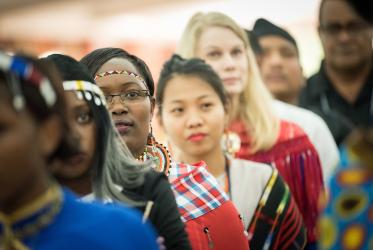Between 1997 and 2010, an average of about 23,000 migrants arrived in Italy each year across the Mediterranean, though the number of arrivals recorded dropped to less than 10,000 between 2009 and 2010. In 2011, the number of migrants arriving in Europe via the Central Mediterranean route rose dramatically: 62,692 sea arrivals were recorded in Italy, a 13-fold increase over the 4,406 recorded in 2010.
From 20-25 May, a delegation of the World Council of Churches (WCC) visited strategic spots in Italy where the churches’ work to assist migrants and refugees are concrete expressions of ecumenical solidarity with those in the search of better life conditions overseas.

The old cemetery of Lampesusa holds a space to honor the memory of the ones who lost their lives trying to reach Europe through the sea. Crosses made with pieces from the boats carrying refugees mark the graveyard of dozen unidentified bodies. In the first five months of 2022, Lampedusa recorded the arrival of over 6,000 migrants to the island. Since 2014, the Mediterranean Sea has become a site of escalating numbers of migrant fatalities. The migratory journeys prior to these Mediterranean crossings are also highly risky, as they often involve crossing remote terrains such as the Sahara Desert and residing, at least temporarily, in countries such as Libya where conditions for migrants are often dangerous.

As the participants of the WCC Pilgrim Team Visit gathered with local church leaders at the “Gateway to Europe,” Rev. Joram H. Calimutan, from the Asia Pacific Mission for Migrants, shared a reflection based on the text of 1 Samuel 7:12. “As a historical reminder, churches and ecumenical institutions are reminded of its historical origin as a Jesus movement. Churches and ecumenical institutions should actively engage in changing these narratives, furthering faith and migrants and refugees communities’ cooperation, partnership and solidarity. Taking part in addressing the root causes of forced migration and massive movement of people.
“ ‘Thus far the Lord has helped us’ is an affirmation that God is indeed Emmanuel. Confronting the root causes of forced migration—poverty, unemployment, landlessness, war and conflict, environmental destructions and other social evils,” said Calimutan.

Marta Barabino, coordinator of Mediterranean Hope’s Migration Observatory in Lampedusa, shares updates of the work they developed in the region. Active since 2014, the Observatory’s work includes first reception, mediation, data gathering/communication/updates and research. It is an initiative of the Migrant and Refugee Programme of the Federation of Protestant Churches in Italy established in the wake of the tragedy on 3 October 2013 when, just a few miles from the island of Lampedusa, 368 people died in a terrible shipwreck. On 16 May 2022, approximately 500 people were in distress in the Maltese Search and Rescue zone after leaving from Tobruk, Libya. The Italian Coast Guard rescued them during the night, and they disembarked in Lampedusa.

Migrants tend to be disembarked on Lampedusa Island as part of Operation Triton, the Frontex-led border enforcement operation, which started in November 2014. From the small harbour of Lampedusa, they are transferred to the hotspot, which is located in a hollow in the central part of the island. Here the Italian police monitored by Frontex officers perform identification procedures on the spot, both temporally, as immediate identification, and spatially, with a full screening conducted on the island before people get assigned to their different paths and transferred away from Lampedusa. Hotspots are infrastructures for intensified interventions by European agencies to support the border functions of member-states in areas of intense migratory flows. Since October 2015 four such hotspots have opened—Lampedusa, Pozzallo, and Trapani in Italy, and Lesbos in Greece — all located in turbulent border “spots” along the Mediterranean frontier of Europe.

The regional focus of the WCC Pilgrimage of Justice and Peace in 2022 is Europe with the assembly theme: “Christ’s love moves the world to reconciliation and unity.” The WCC Pilgrim Team visit to Italy focused on migration and refugees. It was facilitated by Churches’ Commission for Migrants in Europe and hosted by Federation of Protestant Churches in Italy. Among the objectives of the visit, there was the will to express solidarity and accompaniment with the refugees and migrants arrived in Italy and to solidify ecumenical bonds among WCC member churches in the country, the Federation of Protestant Churches in Italy, and related organizations and networks in their efforts to humanitarian and social project that welcome and help refugees integrate into society.






